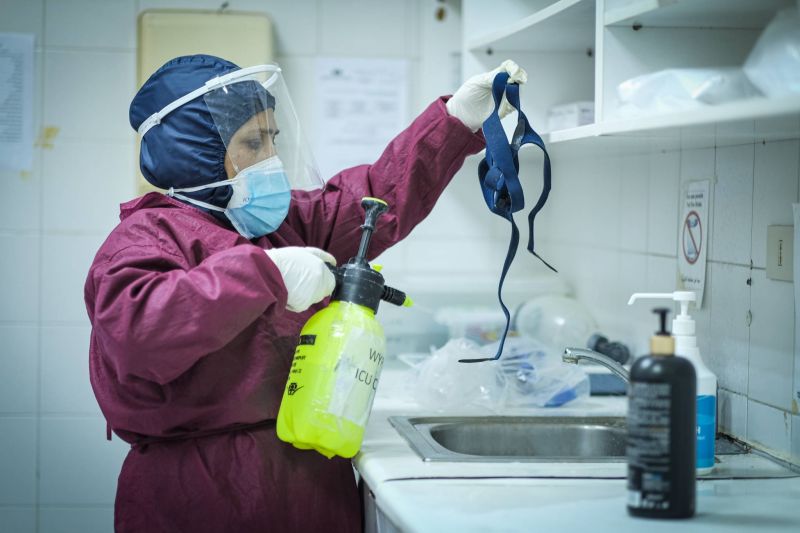
A nurse sterilizes equipment used in a COVID-19 ward. (Credit: João Sousa/L’Orient Today)
BEIRUT — Hospitals continue treating a steady stream of coronavirus patients as the country readies itself to receive the first batch of COVID-19 vaccines tomorrow.
The Health Ministry said that 2,934 people tested positive for the virus on Friday, while 49 people died, bringing the death toll to 3,915.
New infections have dropped from their mid-January highs, when more than 4,000 people were regularly testing positive each day. This drop has translated into a small but welcome decrease in hospital occupancy, with 76.2 percent of regular COVID-19 beds occupied across Lebanon, according to the latest data from the World Health Organization, compared to 78.2 percent a week prior. ICU occupancy has dropped about half a percentage point, still just under 90 percent.
The first batch of vaccines, supplied by pharma giant Pfizer, is set to arrive at Beirut’s airport tomorrow at 4 p.m., with officials gearing themselves up for a countrywide inoculation campaign. Some 2.1 million doses have been secured from Pfizer to go alongside 2.7 million doses through the WHO’s COVAX platform.
At Abdullah Al Rassi Governmental Hospital in Halba, Akkar, general manager Mohammad Khodrin pitted his hopes on the vaccination campaign to “decrease the number of infections even more.” His facility, one of the 49 selected to administer the shots, is aiming to vaccinate some 200 people per day, he told L’Orient Today.
“Everything is set up and we will administer our first shot either on Tuesday or Wednesday,” he said. Like elsewhere, Khodrin’s facility will begin by inoculating medical staff before turning to other at-risk groups.
However, he expressed concern over the hesitancy some have about taking the vaccine, saying that “the number of vaccines we administer can increase as long as more and more people become convinced [to get it].”
Earlier this week, Firass Abiad, the general manager of Rafik Hariri University Hospital, warned of residents’ hesitancy toward the vaccine, saying that a recent survey showed that “only 33 percent of responders above 65 years of age (high risk) want to get vaccinated.”
As of Friday, only 392,945 people had registered to receive the vaccine: 52.86 percent from Mount Lebanon, 17.65 from Beirut and the rest scattered across Lebanon’s other provinces.
While awaiting the vaccine, the hospital continues to treat coronavirus patients with its dedicated beds almost full.
“Beds are still almost fully occupied even though the number of patients entering the ER has dropped,” Khodrin said.
Khodrin went on to lament a lack of compliance in Akkar with the ongoing countrywide lockdown.
“Akkar is an impoverished region, making it hard for people to refrain from work,” he said.
Echoing this sentiment, Abiad on Friday tweeted, “Deprived groups are far less likely to isolate because they do not have the resources to act as required.”
At Rizk Hospital in Beirut, nursing supervisor Rita Bou Madi credited the countrywide lockdown with slightly easing pressure on the facility.
“After expanding our emergency room, we started taking in more and more patients, as the situation was critical,” she said.
New cases are continuously being admitted, she said, but both staff and patients have become more accustomed to the crisis.
“Some people with less severe symptoms are staying at home and tending to themselves,” she said, highlighting that the load on the ER has dropped.